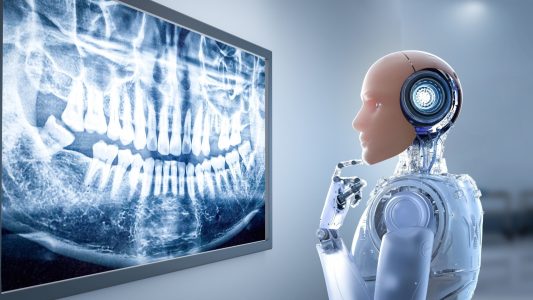Artificial intelligence (AI) has the potential to dramatically reshape the field of dentistry, improving diagnostic accuracy, patient care, and treatment planning. By processing vast amounts of data, AI systems can assist dental professionals in making more informed decisions, enhancing the precision of treatments, and streamlining office operations. In recent years, AI has become an indispensable tool for many dental practices, and its influence is only expected to grow in the coming decades.
AI in Diagnostics: A Leap Toward Accuracy
AI-powered diagnostic tools are one of the most significant advancements in modern dentistry. Traditionally, diagnosing dental issues such as cavities, root infections, and gum disease involved physical examinations, X-rays, and sometimes even patient feedback. However, AI algorithms now allow dental professionals to analyze images with unprecedented accuracy, helping identify issues before they become more serious.
A 2022 study published in the Journal of Dental Research revealed that AI diagnostic tools could detect cavities with 96% accuracy, far surpassing traditional methods. The AI system uses deep learning models trained on vast datasets of dental images to identify patterns indicative of dental issues. This level of precision is particularly important for early detection of conditions like oral cancer, which can be challenging to spot with the naked eye.
Furthermore, AI helps reduce human error by flagging abnormalities in images that a dentist might miss. This can lead to quicker diagnoses and earlier intervention, ultimately improving patient outcomes.
Personalized Treatment Plans: AI as a Data Processor
Another area where AI is making a major impact is in personalized treatment planning. AI systems can analyze a patient’s medical history, genetic information, and lifestyle factors to generate tailored treatment recommendations. These systems are capable of suggesting individualized treatment plans based on a deep understanding of each patient’s unique needs.
For example, AI-driven platforms can suggest the most effective treatment for various types of tooth decay, offering more options to patients based on the severity and location of their condition. By incorporating data from various sources, AI can also help dental professionals consider factors such as a patient’s age, overall health, and dental history, ensuring that the treatment plan is as effective and comfortable as possible.
AI and Patient Management: Improving the Patient Experience
Beyond diagnostics and treatment planning, AI is also transforming how dental practices manage patient interactions. For example, AI-driven chatbots can assist with appointment scheduling, answering common questions, and providing pre- and post-treatment instructions. These systems allow dental practices to offer better customer service, increase patient engagement, and reduce the workload on office staff.
AI can also be used to predict patient behavior. By analyzing historical data, AI can identify patterns such as the likelihood of a patient missing an appointment or following up with prescribed treatments. This predictive ability helps dentists maintain a high level of care and reduce missed appointments, which can lead to lost revenue and delayed treatments.
Challenges and Ethical Considerations
While AI brings many benefits to the dental field, it is not without its challenges. One of the main concerns is data privacy. Since AI systems rely on vast amounts of personal data, there are inherent risks associated with storing and processing sensitive patient information. Dental practices must ensure that they adhere to strict data security protocols to avoid breaches and protect patient confidentiality.
Additionally, the widespread use of AI requires dental professionals to undergo continuous training. As AI technology evolves, dentists must be able to interpret AI-driven insights and integrate them into their practice effectively. This poses both a challenge and an opportunity for professional development in the dental field.
Finally, there are ethical considerations regarding the role of AI in clinical decision-making. While AI can enhance diagnostic capabilities, it is essential that dental professionals maintain control over treatment decisions. AI should be seen as a tool to assist professionals, not replace them entirely.
The Future of AI in Dentistry
The future of AI in dentistry is promising, with the potential to enhance every aspect of patient care, from diagnosis to treatment to ongoing management. As AI systems become more sophisticated and accessible, their role in dentistry will likely expand into areas like robotic surgery, personalized orthodontics, and even real-time patient monitoring during procedures.
Moreover, AI can be used in conjunction with other emerging technologies, such as 3D printing and virtual reality, to offer fully customized and innovative treatments. With AI leading the way, the dental industry is poised for a revolution that will not only improve efficiency but also offer better and more precise care for patients.




Dave4397
July 25, 2025https://shorturl.fm/2zME1
Gwendolyn3290
July 25, 2025https://shorturl.fm/1vull
Haleigh1994
July 26, 2025https://shorturl.fm/9Mxdn
Adelyn2639
July 26, 2025https://shorturl.fm/LCQpJ
Lila712
July 26, 2025https://shorturl.fm/OjpdD
Casey435
July 26, 2025https://shorturl.fm/5Y5a2
Kane266
July 27, 2025https://shorturl.fm/etybI
Blair1769
July 27, 2025https://shorturl.fm/UHSLT
Eugene4930
July 27, 2025https://shorturl.fm/EI0cm
April2701
July 28, 2025https://shorturl.fm/x9k71
Joel4443
July 29, 2025https://shorturl.fm/fLlbl
Molly1182
July 29, 2025https://shorturl.fm/XXnmN
Adele1556
July 29, 2025https://shorturl.fm/KPTAA
Micah540
July 29, 2025https://shorturl.fm/xnggV
Gerard409
July 30, 2025https://shorturl.fm/i8W1N
Shelby4492
July 30, 2025https://shorturl.fm/k9OWh
Kaleb2256
July 30, 2025https://shorturl.fm/myHra
Alexa579
July 30, 2025https://shorturl.fm/d6HLb
Jordan198
July 30, 2025https://shorturl.fm/o0CJU
Walter4558
July 30, 2025https://shorturl.fm/b4mAz
Kathy2817
July 30, 2025https://shorturl.fm/ivQP0
Bob3684
July 31, 2025https://shorturl.fm/8RNq8
Naomi3365
July 31, 2025https://shorturl.fm/CBL3H
Austin2861
July 31, 2025https://shorturl.fm/vHrRo
Trent3731
July 31, 2025https://shorturl.fm/5I5GH
Natasha1913
August 2, 2025https://shorturl.fm/UrLTf
Colette3142
August 2, 2025https://shorturl.fm/GX1yN
Marcel1827
August 2, 2025https://shorturl.fm/LAmlz
Hallie3677
August 2, 2025https://shorturl.fm/mggsh
Claudia1852
August 2, 2025https://shorturl.fm/6hNwL
Nikita371
August 2, 2025https://shorturl.fm/R6PUC
Felix3392
August 2, 2025https://shorturl.fm/nvWjt
Agnes2158
August 2, 2025https://shorturl.fm/V6B1F
Alberto3155
August 3, 2025https://shorturl.fm/oB0Ie
Eden688
August 3, 2025https://shorturl.fm/UwLlr
Phyllis3528
August 3, 2025https://shorturl.fm/TP0Ei
Clifton3183
August 3, 2025https://shorturl.fm/qqf35
Elizabeth1915
August 4, 2025https://shorturl.fm/WLi9V
Freddie752
August 4, 2025https://shorturl.fm/uwar9
Mira3531
August 4, 2025https://shorturl.fm/Hu66W
Edgar491
August 4, 2025https://shorturl.fm/uWeav
Abby2805
August 4, 2025https://shorturl.fm/ldKJo
Damian3084
August 8, 2025https://shorturl.fm/syDSl
Mateo3652
August 8, 2025https://shorturl.fm/OXw5J
Sofia182
August 9, 2025https://shorturl.fm/3e8MJ
Brinley2048
August 11, 2025https://shorturl.fm/c1QrO
Brayden2101
August 12, 2025https://shorturl.fm/xe8aa
Lillian4935
August 12, 2025https://shorturl.fm/SJH3Z
Aiden2732
August 13, 2025https://shorturl.fm/uV4NE
Ariel1093
August 29, 2025https://shorturl.fm/8i6d0
Sadie1388
September 3, 2025https://shorturl.fm/pf0HY